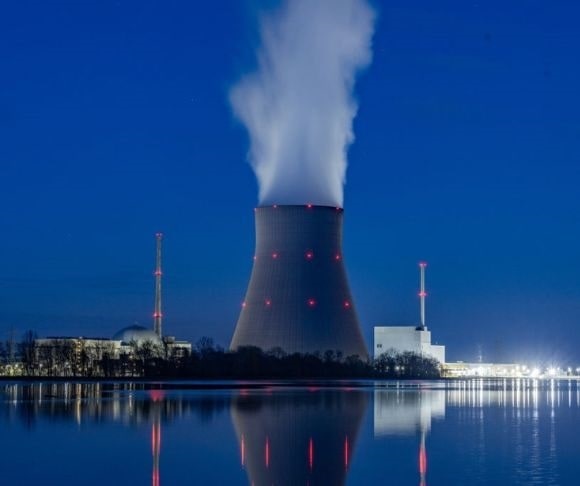Over the weekend, Germany shut down its last three remaining nuclear power plants and experts are mixed on the repercussions, if any. With climate change solutions a top priority and many countries working on expanding nuclear energy, German officials decided to make good on the promise to remove the reactors. But that vow was made before the Russia-Ukraine war. Now that gas supplies from Russia are no longer a reliable option, citizens and some scientists suggest keeping the plants in working order, at least for now.
The Road to Phasing Out Nuclear Plants
“It began as a movement of pacifists chaining themselves to fences outside nuclear power plants,” wrote The New York Times. “Five decades later, the effort to close German nuclear power plants will end with echoes of the Cold War era in which it began, as Russia’s war in Ukraine is a reminder of both the risks and promise of nuclear energy.”
The country started producing nuclear energy in the 1960s with dozens of reactors built over the next few decades. The idea was to switch to a cleaner alternative than coal. But then, in 1979, the Three Mile Island incident happened, inciting fears among the people.
In the 1970s, right in the middle of the Cold War, peace activists started a strong campaign against atomic power. Some of these protesters became the founding members of the Green party, which is now part of Chancellor Olaf Scholz’s three-party coalition. Those efforts accelerated in 1986, when fallout from the Chernobyl disaster in the Society Union reached Germany.
The Energiewende (energy transition) movement began with a law passed by social Democrats and the Greens in 2002 that dictated no new plants could be built and existing reactors must be shut down. However, in 2010, former Chancellor Angela Merkel announced nuclear power plants would continue for the time being because they produced fewer greenhouse emissions than coal or gas and the country wasn’t yet ready to be without nuclear power.
Only a year later, Merkel reversed that decision after an earthquake triggered a tsunami that disabled Japan’s Fukushima nuclear plant’s power and cooling systems, causing a “nuclear accident.” She brought forth a law that required 17 reactors to be shut down by the end of 2022. Once again, those plans were foiled by the Ukraine-Russia war. Germans were forced to endure winter without fuel from Russia to help supply heat to their homes. They had to reduce their usage or face rationing. Chancellor Scholz extended the lives of the reactors until April 15 of this year.
Reactions to Removal of the Last Three Reactors
Already a highly controversial topic in Germany, the reactions to dismantling the remaining nuclear power plants are clearly divided. Bild, a German daily newspaper, conducted a survey that found 52% of citizens were against ending nuclear power since the country is still too dependent on fossil fuels from Russia.

(Photo by Armin Weigel/picture alliance via Getty Images)
However, Robert Habeck, the economy minister and also a member of Germany’s Green party, assures the exit from nuclear power is doable. He explained that the natural gas storage tanks are more than half full, which is more than enough, now that spring has arrived and the need for heating homes is nearly over for the year. He also said the country has built liquefied natural gas (LNG) terminals so that gas can be imported from cargo ships instead of having to rely on Russian pipelines that used to provide around 55% of their supply.
Last week, a group of 25 scientists sent a letter coordinated by RePlanet D-A-CH, a chapter of RePlanet to Mr. Scholz. According to its website, RePlanet is “a network of grassroots citizen organisations driven by science-based solutions to climate change, biodiversity collapse and the need to eliminate poverty.” They urged the chancellor to reconsider the move to close the plants, saying, “Germany’s electric grid remains among the most carbon-intensive in Europe.”
Nuclear power is not the only fuel on the chopping block. Coal, which makes up about a third of the country’s electricity production, is scheduled to be phased out by 2038, with the first round of closures set for 2030. Germany’s plan to switch to solar and wind power has critics concerned about blackouts and a lack of energy sources for its citizens.
Andrzej Ancygier from Climate Analytics in Berlin disagrees with the suggestion that nuclear power is more reliable and sustainable than wind or solar. His reasoning is that droughts and high temperatures have forced reactors to shut down since the rivers used to cool the reactors became too low, or the water was too warm to efficiently cool them down. “We’re getting to a place where the planet is becoming warmer, more dangerous and more unstable,” he remarked. “We could end up in a bad place. Safety is an issue here. It’s something we forgot, but we shouldn’t have.”
The war in Ukraine has also shed light on the danger of nuclear plants, according to Steffi Lemke, Germany’s environmental minister. She explained, “We are faced with a situation where nuclear power plants in Ukraine are being shelled because of Russia’s war of aggression and have become the target of military conflicts. Nuclear power plants were never designed for such a situation.”
Germany Cancels Nuclear While Other Countries Embrace It
Unlike Germany, many other countries are making plans to increase nuclear power because of its extremely low carbon emissions. Last year, Poland made a deal with Westinghouse Electric to build its first nuclear plant, just 200 miles east of the German border. Britain, France, and Germany are increasing their nuclear energy sources, and in the US, the Biden administration is supporting technology that would build smaller nuclear reactors to help with “mass decarbonization.”




